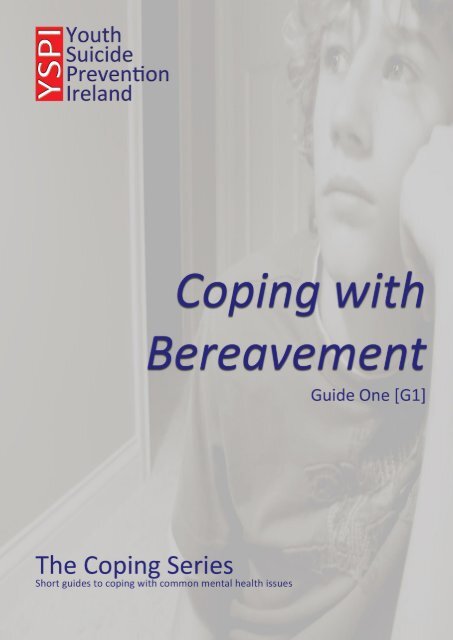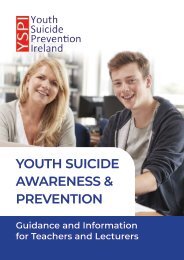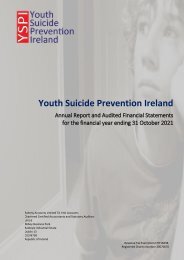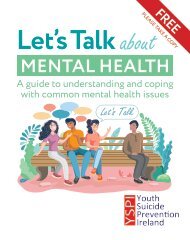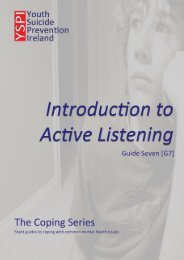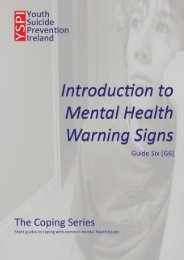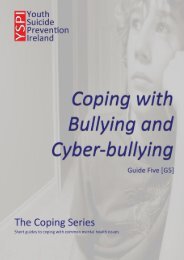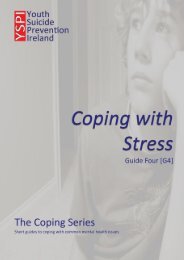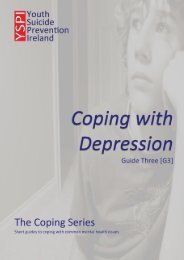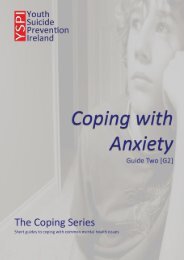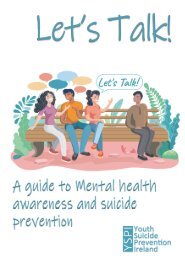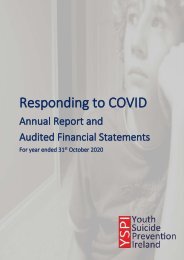CWSG1 - Coping With Bereavement
This guide is part of the Coping With Series. Each guide provides an introduction to the issue, signs and symptoms to be aware of, coping techniques and information on helping friends and family to cope.
This guide is part of the Coping With Series. Each guide provides an introduction to the issue, signs and symptoms to be aware of, coping techniques and information on helping friends and family to cope.
- No tags were found...
You also want an ePaper? Increase the reach of your titles
YUMPU automatically turns print PDFs into web optimized ePapers that Google loves.
<strong>Coping</strong> with <strong>Bereavement</strong><br />
<strong>Coping</strong> <strong>With</strong> Series – Guide One [G1]<br />
First Publications March 2022<br />
© Youth Suicide Prevention Ireland Publications Limited<br />
Written by Dr Hannah England<br />
This document is copyrighted to the authors and licensed to Youth Suicide Prevention Ireland Publications Limited on an<br />
exclusive basis. The Four Steps to Help Programme is republished by kind permission of Alan McKelvie and Anthony Philpott.<br />
Four Steps to Help Programme Copyright © Alan McKelvie and Anthony Philpott 2010 – 2022. All rights reserved. E&OE<br />
This publication may not be copied, reproduced or changed in any way without the express written consent of the publishers.<br />
You must obtain written permission before editing or changing this document. Selling without prior written consent is<br />
prohibited. In all cases this notice must remain intact. This work cannot be retailed or resold without the publisher’s written<br />
consent. Published by Youth Suicide Prevention Ireland Publications Limited.<br />
All information herein is provided as an information resource about suicide prevention and research activities only. It is not<br />
the intention of Youth Suicide Prevention Ireland Publications Limited to provide specific treatment or care advice. Youth<br />
Suicide Prevention Ireland Publications Limited does not provide certification or accreditation for any counselling<br />
organisation, individual practitioners or treatment or care models that users may find out about through our information or<br />
publications or other materials provided by or through us. Youth Suicide Prevention Ireland Publications Limited does not<br />
endorse or recommend any of the service providers, agencies or organisations listed on any leaflet or publication provided<br />
by us or any other organisation. In no event shall liability exist to any user (or any third party who obtains access to the<br />
information) under any law for any loss or damage (including but not limited to direct, indirect, economic and consequential<br />
damage) in respect of any matter whatsoever related to any information in any website or leaflet or publication nor for the<br />
use of the information nor for actions taken or not taken as a result of information contained in this or any other websites<br />
leaflets or publications (including, without limitation, loss or damage caused by negligence). The material contained in this<br />
leaflet is provided for general information purposes only and does not constitute care, treatment or other professional<br />
advice. Due to the general nature of the information provided in the leaflet, should you require specific help, you should<br />
seek the assistance of an appropriately trained professional person. While every care has been taken in the preparation of<br />
the information contained in this leaflet, due to the nature of the information and the processes of publication, the<br />
information may not be complete, correct or up to date. Information contained in this leaflet which has been provided by<br />
recognised third parties is provided in good faith and no liability shall exist for any errors or omissions contained.<br />
YSPI-<strong>CWSG1</strong>-2022
<strong>Coping</strong> <strong>With</strong> <strong>Bereavement</strong><br />
How to Cope with <strong>Bereavement</strong><br />
We will all be affected by a painful loss or a period of grief at some point in our lives. <strong>Coping</strong> with a<br />
bereavement that was sudden or unexpected can leave you feeling intensely saddened, shocked,<br />
overwhelmed and alone.<br />
Grief is a natural process that occurs after a loss, and this leaflet will help you to understand more<br />
about how you might feel in the coming weeks and months, and what you can do to take care of<br />
yourself at this difficult time.<br />
What is a <strong>Bereavement</strong>?<br />
<strong>Bereavement</strong> is an experience of loss and grief. Grief can lead to feelings of extreme sadness,<br />
emptiness, or loneliness. You may feel that you have entered new circumstances in which you are<br />
grieving not only for the person you have lost, but also for the life you had together and for the future<br />
you imagined.<br />
It is sometimes assumed that grief only occurs following the death of someone we are close to, but<br />
the loss of someone we did not know well can also have a significant impact. Losing someone is<br />
incredibly difficult, and it can lead to an overwhelming rollercoaster of emotions. You might worry<br />
that the intense feeling of loss will last forever, and it can be difficult to acknowledge or understand<br />
what has happened.<br />
Despite grief being very painful, it is part of a normal, healthy process that allows you to work through<br />
the loss you have experienced. Although you might like to wave a magic wand and not have to<br />
experience the grieving process, going through it is part of a healing process. One day, your emotions<br />
will not feel as raw, and you will feel better able to manage your loss.<br />
What are the Symptoms of Grief?<br />
Grief that occurs straight after a bereavement or loss tends to feel intense and all-consuming. You<br />
may notice some of the following symptoms.<br />
Sadness<br />
This is the most common reaction to the loss of someone close to you. You may feel incredibly sad or<br />
low, and find that you are often tearful or crying.<br />
Shock<br />
At first, it can be hard to believe that someone is no longer with you. Some people describe feeling<br />
numb or lost. Although you might expect to be sad or tearful, sometimes shock prevents you from<br />
feeling anything and you may not cry at all. This is a protective factor that may only last a few hours<br />
or days, before sadness and grief occur.<br />
<strong>Coping</strong> <strong>With</strong> Series Page 3
<strong>Coping</strong> <strong>With</strong> <strong>Bereavement</strong><br />
Anger<br />
Regardless of how or why someone died, it is normal to feel angry. You may feel angry that you have<br />
been left alone, angry that they are no longer here, angry that you have grief to cope with, or angry<br />
about the way that they died.<br />
Guilt<br />
Guilt commonly occurs, but it is rarely necessary. You might feel guilty that the circumstances of their<br />
death are not fair, guilty that you didn’t say something different before they died, or guilty if you had<br />
not seen them in a while.<br />
Complex, and often confusing, emotions are common during the grieving process.<br />
<strong>Bereavement</strong> and Sudden Loss<br />
Managing the loss of someone who struggled with their mental health, or losing someone suddenly,<br />
can create additional layers of complex feelings. If you have lost someone in this way, your grief may<br />
seem different to others.<br />
It is normal to experience sadness, shock, anger and guilt. However, you may also find that you feel<br />
intensely frustrated, confused, distraught or pained by your loss. Loss can be incredibly distressing for<br />
those left behind, and this can be compounded by feelings of betrayal at the circumstances in which<br />
someone has died. Losing someone suddenly can also make you feel more isolated, or make talking<br />
about your loss feel harder. It is common to feel ashamed or guilty, but you must try to remember<br />
that you are not to blame.<br />
While you are mourning, there are things that you can do to try to manage the emotions that you<br />
experience so that they feel slightly more bearable.<br />
How Can I Manage Grief?<br />
When you lose someone, you might feel that you will never recover from it. Grief is different for<br />
everyone, but your life will find its way to a new normal which could be similar, or quite different, to<br />
the life you had before your loss. The grieving process can’t be rushed, but there are ways that you<br />
can make grief feel more manageable.<br />
Try Talking<br />
At first, it can feel very difficult to be open about how you feel. Speaking to friends or family is healthier<br />
than keeping it all inside you. At first, you may only need a shoulder to cry on, but in time you may<br />
find that you can start explaining how you feel. Once you start talking, you will find it easier to process<br />
your own emotions.<br />
Continue Activities<br />
In the early days, you might not feel like going to work, seeing friends, or carrying on with your<br />
hobbies. You may even feel some guilt at trying to do something enjoyable after losing a loved one.<br />
However, going through trauma doesn’t mean that you don’t deserve to do things that make you feel<br />
like you again. Invite a friend round for coffee, do some exercise, or go for a walk outside. Do things<br />
Page 4<br />
<strong>Coping</strong> <strong>With</strong> Series
<strong>Coping</strong> <strong>With</strong> <strong>Bereavement</strong><br />
that will take your mind off your grief, or alternatively give you the time and space to work through<br />
your feelings.<br />
Arrange Counselling or a Talking Therapy<br />
You may benefit from counselling or another form of talking therapy following a bereavement.<br />
Speaking to a professional can help you to make sense of your feelings. This can be particularly helpful<br />
if your grief is complex and involves feelings of guilt, shame or disbelief.<br />
Seek Medical Advice<br />
Grief can lead to a low mood, anxiety or depression. If you are worried about your own mental health,<br />
speak to your doctor for further advice. Grief is easier to manage if your own health is better<br />
supported.<br />
Manage Special Days<br />
Special days such as birthdays or anniversaries can feel particularly difficult. Having a plan can help<br />
you to manage the emotions that are likely to arise on these days. For example, you might like to<br />
spend the day with friends or family, or you may seek distractions by going to the cinema or booking<br />
a holiday for any difficult dates.<br />
How can I help my friend who is going through a bereavement?<br />
Watching someone else trying to manage grief can be very upsetting. Even if you did not know the<br />
person who died, you may experience your own form of grief in watching a friend try to manage their<br />
loss.<br />
It can take a long time for someone to work through a bereavement, but during this time you can<br />
support them by:<br />
Letting them know that you are there for them if they need you<br />
<br />
<br />
<br />
<br />
<br />
<br />
<br />
<br />
Telling them that you can listen if they want to talk<br />
Keeping in touch by text or phone if they don’t feel up to meeting up<br />
Reminding them that it wasn’t their fault, and that they do not need to feel guilty or<br />
ashamed<br />
Offering to go for a coffee with them, or arranging a walk together<br />
Not judging the length or intensity of their grief<br />
Asking if they would like to talk about the person they have lost<br />
Offering to help them find a counsellor to speak to<br />
Encouraging them to keep going to clubs, activities, or social events, once they feel<br />
up to it.<br />
It might be helpful to remember that grief does not follow an expected pattern. Someone who is<br />
experiencing grief might seem to be managing well one day, but be unable to get out of bed the next.<br />
The months following a bereavement can appear to be full of ups and downs, but gradually over time,<br />
the intensity of emotions is likely to start settling down.<br />
<strong>Coping</strong> <strong>With</strong> Series Page 5
<strong>Coping</strong> <strong>With</strong> <strong>Bereavement</strong><br />
How can I help my child who is going through a bereavement?<br />
A child who is coping with loss will experience sadness and grief. Just as for an adult, grief is a form of<br />
healing and a time when difficult thoughts and feelings are processed. Although it will be painful for<br />
your child, and painful for you to watch them go through, grief is a normal part of life. Reassuringly,<br />
there are some things you can do to help your child navigate their loss.<br />
<br />
<br />
<br />
<br />
<br />
<br />
<br />
<br />
<br />
<br />
<br />
Encourage your child to talk about how they are feeling, and listen without judging<br />
Explain that loss can be very difficult to accept, particularly when it occurs<br />
unexpectedly or suddenly<br />
Allow your child to ask questions about their loss<br />
Try to stay involved in recognising what your child is feeling, as this can change from<br />
day to day<br />
If your child finds it difficult to talk, they may find it easier to express their feelings by<br />
writing in a journal, drawing, painting, singing or another creative outlet<br />
Acknowledge your child’s loss in a supportive but matter-of-fact way, without being<br />
dramatic or too detailed about the death<br />
Make sure that your child knows that the death was not their fault, and that they<br />
should not feel guilty or ashamed<br />
Explain that it can take many months for the shock of loss to wear off, and that grief<br />
takes time to work through<br />
Support your child if they want to attend the funeral<br />
Look out for signs of low mood, depression or anxiety, and seek medical advice if you<br />
are concerned<br />
Ask your child if they would like to speak to a counsellor, and support them in doing<br />
so.<br />
If you are worried about the mental health of someone who is grieving, it is important that you<br />
encourage them to seek help from a doctor or a mental health team.<br />
If you are concerned about yourself, a friend or your child, you can seek emergency assistance at any<br />
time. FreeText HELP to 50015 24/7 or visit www.ineedhelp.ie. Always call 999 or 112 for Gardaí,<br />
Ambulance or Fire if someone is seriously ill or injured, or their life is at risk.<br />
Page 6<br />
<strong>Coping</strong> <strong>With</strong> Series
<strong>Coping</strong> <strong>With</strong> <strong>Bereavement</strong><br />
Help and Assistance<br />
If you are concerned about yourself, friends or family get immediate support and information 24/7 by<br />
FreeTexting HELP to 50015 from any mobile. Texting 50015 is free of charge from any network and<br />
you can text this number even if you have no credit. This service is fully confidential.<br />
Visit www.ineedhelp.ie for more detailed crisis support information on:<br />
• How to help in a crisis<br />
• Emergency Contacts<br />
• National Helplines<br />
• Local Support Groups<br />
• Directions to your nearest GP or out of hours clinic<br />
• Directions to your nearest safe place or refuge<br />
Always call 999 if someone is seriously ill or injured, and their life is at risk.<br />
Gardaí / Ambulance / Fire call 999 or 112<br />
<strong>Coping</strong> <strong>With</strong> Series Page 7


